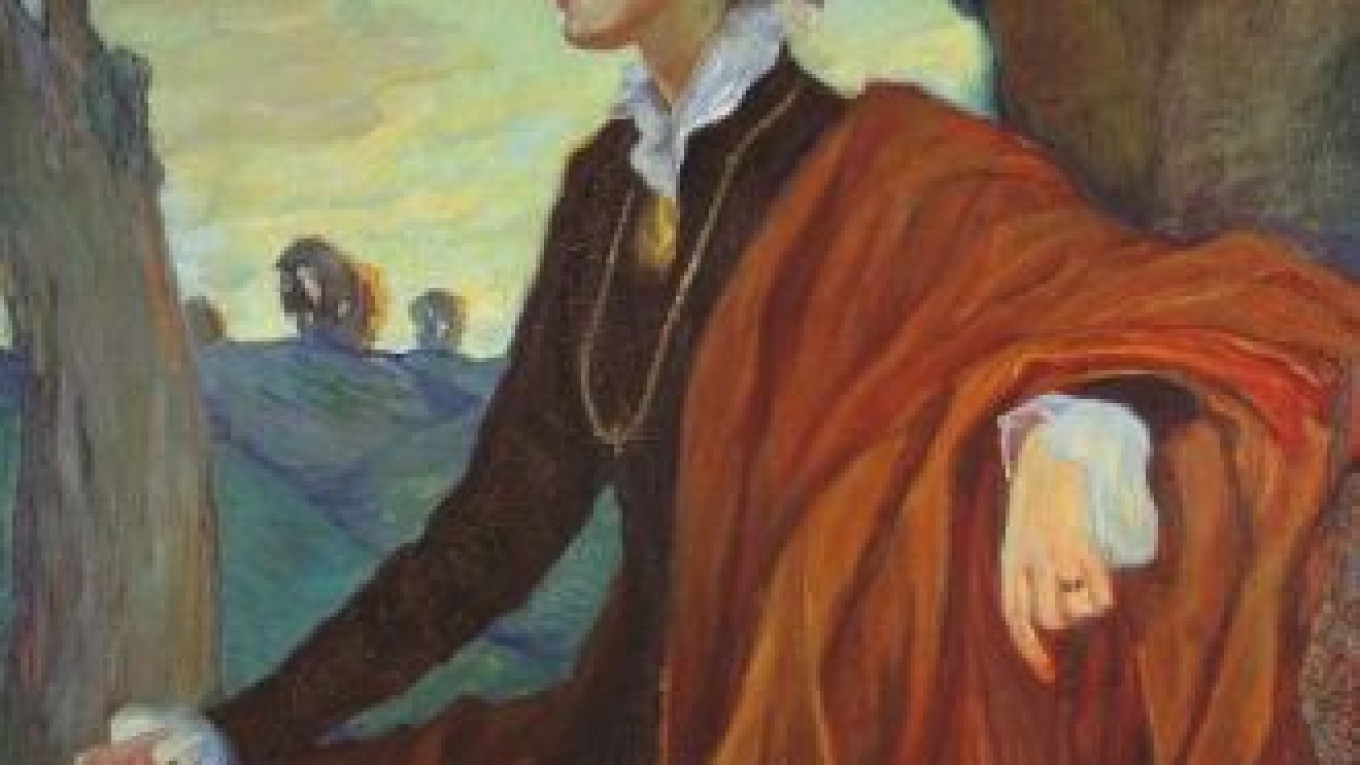ST. PETERSBURG — The legendary St. Petersburg cafe Stray Dog, once the haunt of Silver Age writers such as Vladimir Mayakovsky and Anna Akhmatova, is celebrating its centenary with a series of cultural events.
Opened on the cusp of 1911 and 1912, the Stray Dog cafe became Russia's first literary and artistic night cellar.
The story goes that writer Alexei Tolstoi gave the cellar its name as he and others looked for a cultural refuge in the city, saying "Why are we running around like stray dogs?" And the name stuck.
The cafe's location — in a cellar near the imperial Mikhailovsky Theater — was deemed ideal as it was hidden away from prying eyes.
"The name of the cafe is associated … with the image of a homeless and unsettled artist, who could find refuge in this cellar, warm up by the fireplace and find himself in a friendly group," said Yevgenia Aristova, the current director of the Stray Dog.
"The idea of the cafe was to establish a place where young creative people, maybe not always well-known, could get together, talk to each other and become inspired to create something."
The Stray Dog attracted those who would eventually become a major part of the history of the Silver Age, leaving a deep imprint on world culture.
The poet Akhmatova depicted the era in a large part of her works. Futurist writer Mayakovsky started his creative path at the Stray Dog, where he read his poetry in public for the first time. Time spent at the cafe became a period of searching for new rhythms and dynamics for him. For Akhmatova's friend and fellow poet Osip Mandelshtam, the Stray Dog was associated with the heights of European classicism.
"They were people who brought with them a new creative consciousness, a new lifestyle, a self-perception as people of a new age, overcoming 19th-century limitations and prohibitions," said Nina Popova, director of the city's Anna Akhmatova museum.
Others who made the cafe their home included composer Arthur Lourie, who worked on and presented new musical compositions, and a number of painters, including Sergei Sudeikin, Nikolai Sapunov and Nikolai Kulbin, who were looking for new ways to represent human beings. Akhmatova's husband, the Acmeist poet Nikolai Gumilyov, was a regular guest at the cafe, as were the writer Velimir Khlebnikov and theater director Vsevolod Meyerhold.
In its original form, the Stray Dog cafe existed for just 3 1/2 years — until 1915 — when World War I and the revolutionary atmosphere took Stray Dog regulars — mainly preoccupied by their creativity — by surprise.
War was not the only reason the cafe closed. "The Stray Dog began to turn into a dump … into a typical trashy place where affairs and love triangles began," Popova said somewhat primly.
Mayakovsky poured fuel on the flames with his controversial poem "You!" in which he accused the cafe's regulars of sitting comfortably in a bar while others fought in the war.
"There was a huge scandal after this," Aristova said. "Many women passed out [when he read the poem at the cafe]. The next morning, all of the papers wrote about the incident. That attracted the attention of the police and eventually led to the closing of the cafe after alcohol was found there, despite a dry law being in place," she said.
During both world wars, the Stray Dog cellar was used as a bomb shelter. In August 1941, Akhmatova sought refuge in the nearest bomb shelter during an air raid. When she raised her head and looked at the ceiling, she realized that it was the cafe ceiling painted all those years ago by Sudeikin.
"Like all its visitors — [Akhmatova] never forgot about the Stray Dog, and in 1940 she wrote the poem 'Mayakovsky in 1913' about Mayakovsky's creative activity during the Stray Dog period and how he never fully fit in with the cafe's atmosphere," Popova said.
It was only in the perestroika era that it became possible to talk about resurrecting the Stray Dog cafe. Local enthusiast Vladimir Sklyarsky spent years working on reconstructing the cafe with the help of photographs. After 12 years, the cafe reopened in 2001. Sklyarsky died a year before the Stray Dog reached its 100th birthday.
"The ceiling was covered in plaster [originally]," Aristova said. "Now just a single piece of plaster remains; we keep it as a museum piece. But the historic brickwork is original and has a memory of those who have been through here," she added.
Today, the Stray Dog hosts literary evenings, exhibitions and concerts. Local cabaret rock group Billy's Band made their first steps in the Stray Dog.
"Historically and stylistically, it's an absolutely different place," Popova said. "But it's important that the name 'Stray Dog' is being heard again."
"To come here, to touch these walls, it's a wonderful feeling," she said.
Stray Dog. 4 Italyanskaya Ulitsa. Metro Gostiny Dvor. St. Petersburg. Tel. (812) 312-8047.
A Message from The Moscow Times:
Dear readers,
We are facing unprecedented challenges. Russia's Prosecutor General's Office has designated The Moscow Times as an "undesirable" organization, criminalizing our work and putting our staff at risk of prosecution. This follows our earlier unjust labeling as a "foreign agent."
These actions are direct attempts to silence independent journalism in Russia. The authorities claim our work "discredits the decisions of the Russian leadership." We see things differently: we strive to provide accurate, unbiased reporting on Russia.
We, the journalists of The Moscow Times, refuse to be silenced. But to continue our work, we need your help.
Your support, no matter how small, makes a world of difference. If you can, please support us monthly starting from just $2. It's quick to set up, and every contribution makes a significant impact.
By supporting The Moscow Times, you're defending open, independent journalism in the face of repression. Thank you for standing with us.
Remind me later.






